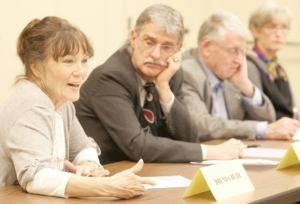A firsthand view of life with an Alzheimer's patient
By Phyllis Moore
Published in News on February 22, 2012 1:46 PM

News-Argus/ALLISON CARTER
Brenda Behr talks about her experiences caring for her mother, who had Alzheimer's disease, Tuesday evening at the Wayne County Public Library. The local artist was one of five members on the Alzheimer's Caregivers Panel, part of a discussion of the Wayne County Reads book, "The Pleasure was Mine." Also pictured are local attorney Bob Fuller, Kivett Ivey and Martie Saylors.
Kivett Ivey had seen other families experiencing Alzheimer's disease.
But nothing prepared him for when it struck his own.
"The first time my wife asked me who I was -- 'Who are you?' -- I kind of went into shock," he recalls. "But I recovered, and we went on from there."
There were plenty of difficult decisions in the days ahead.
"I don't know which was the hardest. I had to make myself get help. I got so I took four or five hours every day just to go somewhere," he said, calling on others to step in and sit with his wife, Lucille. "I had to make some decisions whether to go the nursing home route or stay at home. I decided to stay at home.
"I do not regret it."
The couple were married 69 years, the last 15 in the throes of an unpredictable disease -- sometimes battling bouts of unrecognition or repetition of the simplest activities, like her daily re-reading of favorite passages of Scripture until she almost wore out her Bible, her husband said.
But true to his marriage vows, he was a committed caregiver to the end. She passed away in 2009.
"We had a long life together. We loved each other," Ivey said. "Our love and our trust in each other and our trust in the Lord gave me the strength I needed to take care of her."
As a husband, it was his responsibility, he said. And while he had support from family and church members, it was not always easy.
Along with Ivey, four other area residents, who had cared for parents with Alzheimer's, rounded out a panel at Wayne County Public Library Tuesday night, focusing on the topic, "Understanding Alzheimer's from a Caregivers Perspective."
The event was in conjunction with this year's Wayne County Reads selection, "The Pleasure was Mine" by Tommy Hays, about a family dealing with a matriarch with memory loss.
"As an only child, I can relate to the book very easily," said panelist Miriam Wessell, whose retirement as head of the liberal arts and math department after 28 years at Wayne Community College was precipitated by the need to care for her mother.
"It was extremely difficult to be two places at one time," she said. "There was always guilt. I can remember the stress level of being with Mama and feeling that I needed to be there."
Martie Saylors experienced a similar pull, except her mother lived in Raleigh when the Alzheimer's diagnosis came a decade ago. This past year, the family moved Mrs. Saylor's mother to a facility in Smithfield.
"I think one of the most difficult things was reaching the point of realization that the level of care needed to increase," she said.
Local artist Barbara Behr returned to her hometown to care for her mother until she died.
"If I had to write a book, it would not be (called) 'The Pleasure was Mine,'" Ms. Behr said. "It's a disease that affects the entire family. Whether there's a specific caregiver or it's shared responsibility. It certainly impacts the entire family."
Caring for a loved one is difficult at best, without the compounded aspects of a dementia that robs them of memories and recognition.
It can also splinter families, some on the panel said.
"Mother had 20 nieces and nephews -- she was the baby of seven," Mrs. Wessell said. "The four years that mother lived with me, I only had one niece come to visit. They didn't come, didn't call."
When her mother's death was imminent, Mrs. Wessell said she notified factions of each family. They turned out full force.
"I had all this anger well up inside me -- 'Where have you been all these four years?' she recalled.
Then one "crazy lady" gave her some well-intended advice, she said.
"She told me they were doing this for them, not for my mother, and to go home and get rid of the anger ... find something of my mother's and that would bring healing," she said.
And it did.
Among all the challenges of handling the caregiver role, local attorney Bob Fuller said, hands-down, the most difficult area was placement.
The death of Fuller' mom seemed to accelerate his father's memory impairment. For three years, he lived with Fuller until additional care was required.
"He started wandering," he said. "The neighbors didn't tell me at first. They would just take care of him and bring him back."
Finding a facility equipped to handle the dementia-related symptoms has helped, Fuller said.
"He didn't have to compete," he said. "He could be himself at these places and he didn't have to compete."
Despite the painstaking days for those dealing with Alzheimer's, panelists said they still hold onto fond memories of their loved ones.
"I have tons," said Mrs. Wessell. "It was my pleasure to take care of my mother. She never lost that sweet spirit ever, until she was non-responsive."
Ms. Behr said she had "13 sketchbooks filled up," as she often took drawing pads with her on visits to doctor's offices, restaurants and other outings with her mother.
"Many of them have my mom sketched into them because she was right in front of me," she said.
